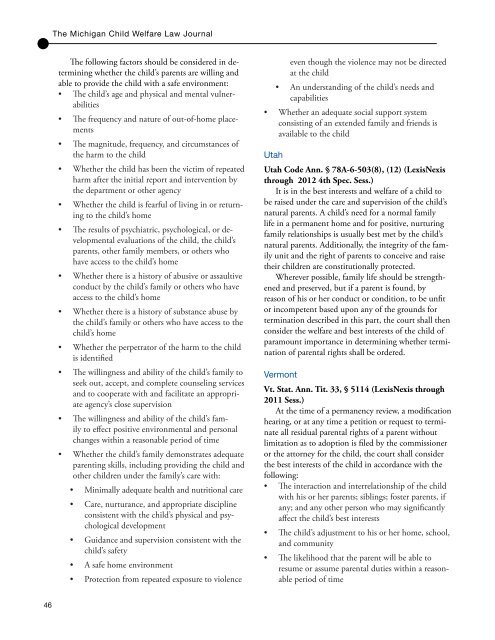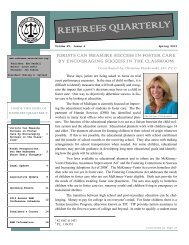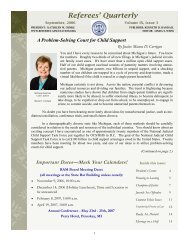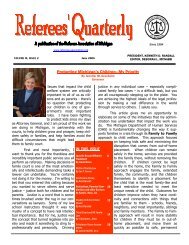The Michigan Child Welfare Law Journal - Referees Association of ...
The Michigan Child Welfare Law Journal - Referees Association of ...
The Michigan Child Welfare Law Journal - Referees Association of ...
Create successful ePaper yourself
Turn your PDF publications into a flip-book with our unique Google optimized e-Paper software.
•<br />
<strong>The</strong> <strong>Michigan</strong> <strong>Child</strong> <strong>Welfare</strong> <strong>Law</strong> <strong>Journal</strong><br />
<strong>The</strong> following factors should be considered in determining<br />
whether the child’s parents are willing and<br />
able to provide the child with a safe environment:<br />
• <strong>The</strong> child’s age and physical and mental vulnerabilities<br />
• <strong>The</strong> frequency and nature <strong>of</strong> out-<strong>of</strong>-home placements<br />
• <strong>The</strong> magnitude, frequency, and circumstances <strong>of</strong><br />
the harm to the child<br />
• Whether the child has been the victim <strong>of</strong> repeated<br />
harm after the initial report and intervention by<br />
the department or other agency<br />
• Whether the child is fearful <strong>of</strong> living in or returning<br />
to the child’s home<br />
• <strong>The</strong> results <strong>of</strong> psychiatric, psychological, or developmental<br />
evaluations <strong>of</strong> the child, the child’s<br />
parents, other family members, or others who<br />
have access to the child’s home<br />
• Whether there is a history <strong>of</strong> abusive or assaultive<br />
conduct by the child’s family or others who have<br />
access to the child’s home<br />
• Whether there is a history <strong>of</strong> substance abuse by<br />
the child’s family or others who have access to the<br />
child’s home<br />
• Whether the perpetrator <strong>of</strong> the harm to the child<br />
is identified<br />
• <strong>The</strong> willingness and ability <strong>of</strong> the child’s family to<br />
seek out, accept, and complete counseling services<br />
and to cooperate with and facilitate an appropriate<br />
agency’s close supervision<br />
• <strong>The</strong> willingness and ability <strong>of</strong> the child’s family<br />
to effect positive environmental and personal<br />
changes within a reasonable period <strong>of</strong> time<br />
• Whether the child’s family demonstrates adequate<br />
parenting skills, including providing the child and<br />
other children under the family’s care with:<br />
• Minimally adequate health and nutritional care<br />
• Care, nurturance, and appropriate discipline<br />
consistent with the child’s physical and psychological<br />
development<br />
• Guidance and supervision consistent with the<br />
child’s safety<br />
• A safe home environment<br />
• Protection from repeated exposure to violence<br />
even though the violence may not be directed<br />
at the child<br />
• An understanding <strong>of</strong> the child’s needs and<br />
capabilities<br />
• Whether an adequate social support system<br />
consisting <strong>of</strong> an extended family and friends is<br />
available to the child<br />
Utah<br />
Utah Code Ann. § 78A-6-503(8), (12) (LexisNexis<br />
through 2012 4th Spec. Sess.)<br />
It is in the best interests and welfare <strong>of</strong> a child to<br />
be raised under the care and supervision <strong>of</strong> the child’s<br />
natural parents. A child’s need for a normal family<br />
life in a permanent home and for positive, nurturing<br />
family relationships is usually best met by the child’s<br />
natural parents. Additionally, the integrity <strong>of</strong> the family<br />
unit and the right <strong>of</strong> parents to conceive and raise<br />
their children are constitutionally protected.<br />
Wherever possible, family life should be strengthened<br />
and preserved, but if a parent is found, by<br />
reason <strong>of</strong> his or her conduct or condition, to be unfit<br />
or incompetent based upon any <strong>of</strong> the grounds for<br />
termination described in this part, the court shall then<br />
consider the welfare and best interests <strong>of</strong> the child <strong>of</strong><br />
paramount importance in determining whether termination<br />
<strong>of</strong> parental rights shall be ordered.<br />
Vermont<br />
Vt. Stat. Ann. Tit. 33, § 5114 (LexisNexis through<br />
2011 Sess.)<br />
At the time <strong>of</strong> a permanency review, a modification<br />
hearing, or at any time a petition or request to terminate<br />
all residual parental rights <strong>of</strong> a parent without<br />
limitation as to adoption is filed by the commissioner<br />
or the attorney for the child, the court shall consider<br />
the best interests <strong>of</strong> the child in accordance with the<br />
following:<br />
• <strong>The</strong> interaction and interrelationship <strong>of</strong> the child<br />
with his or her parents; siblings; foster parents, if<br />
any; and any other person who may significantly<br />
affect the child’s best interests<br />
• <strong>The</strong> child’s adjustment to his or her home, school,<br />
and community<br />
• <strong>The</strong> likelihood that the parent will be able to<br />
resume or assume parental duties within a reasonable<br />
period <strong>of</strong> time<br />
46







